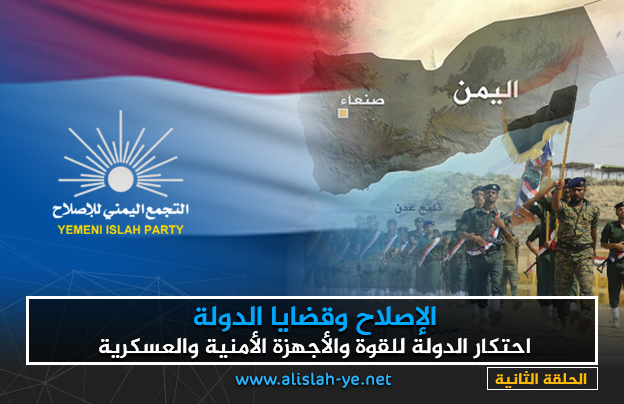Googl plus

The State may monopolize the organized armed force. The State may allow individuals to acquire arms in accordance with a law regulating the purchase and possession of arms, as long as it is a personal weapon, and the State does not allow the emergence of an armed group and also it rather prosecutes and punishes members of that group as outlaws as well as the State has the right to confiscate arms from such individuals.
In any case, States establish the army to protect the country from external aggression, the police to protect internal security and peace, and the intermediary forces for auxiliary functions to support the army and police and deal with any internal rebellion.
In the State's custom, there is no armed group or armed formations outside the control of the Government. States represented by the Authority are working to prevent the emergence of armed formations outside the law and outside the three official constituencies; all these things are considered the constants for the Islah Party.
Any person who can review the modern and contemporary history of Yemen will find armed movements and parties that sought to topple the regime by force and engaged in armed action and violence on a large scale, and even the GPC was not away from that, it gave a cover to turn army units into militias that operated against the State and became managed by the Houthi militias.
As for Houthism, it is an armed rebel movement hostile to the State and has sought to undermine it. It is a movement that does not recognize the State's monopoly of armed force, and even if it itself controls the armed forces, it will still have a parallel militia force, as in the case of Iran's Revolutionary Guards, and is an armed force outside the authority of the State. Despite its control of the army, it retains popular committees.
Is it then said about political forces, movements and illegal groups that they respect this constant of the constants of the State, and work within it, except for the Yemeni Islah Party? Therefore, the Islah remains the most important pillar for the preservation of the Yemeni State, which is committed to its constants. So, the Islah has the right to work under the slogan of the State in counterinsurgency, militias, violence, extremism and terrorism, and this is one of the powers of the State and the Islah is the most important supporter for it.
When the State lost its army and became part of the Houthi militias hostile to the State, it was necessary to create a new army. Before that, many young people organized active resistance in Marib, Taiz and other governorates and it was necessary for the resistance's elements to become military units, and the Islah is with them as a regular army, the State's army, while parties and organizations stood with outlaw militias.
Although the Islah throughout its history has been committed to the State and its legal authority, various forces support outlaw militias instead of standing in political and moral support for the national army and security services affiliated to the Yemeni legitimate government. This situation calls on these political forces to adjust their positions and that the State is more deserving of support and loyalty than any other.
CONCLUSION: Despite the State monopoly of the armed forces and the security services, the Islah respected the national army and gave it political and moral support, and the Islah is against the possession of private militias by a party or a group.